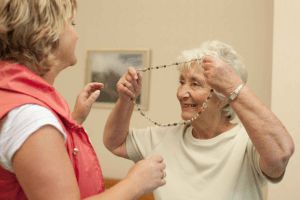In-home care helps people who wish to stay living in their own home, but who also require help and care with various aspects of their day to day life. Carers can help with personal care, cleaning the home, physiotherapy, pet care and nutrition. Carers will also help to improve the quality of life of their client by helping them remain as independent as possible, assisting with health and mobility issues.
Recognising That You Might Need Some Help
The first step to getting care in the home is to identify that you need some help. Perhaps you have noticed certain tasks in your daily routine are becoming very hard, or perhaps you have found yourself increasingly isolated because of mobility issues. Carers can live in your home, or just visit your home on a regular basis, and provide you with:
- Help with personal care
- Help with medication
- Help moving around the home
- Help with household chores
- Nutrition care including cooking and meal planning
- Clinical care
The carer is there to provide you with completely individual, tailored care. A care assessment may be required first to help you understand the level of care you need, but how much you decide you want is completely your choice. Your carer can provide basic care if that is all you need and want, but they can also provide help like accompanying you on hospital visits or even providing pet care. Your care package is unique to you, and you will be fully involved in choosing the carer that comes to work with you.
Home Care Combats Loneliness
It is also important to understand that care at home also offers companionship. According to recent statistics, 11% of elderly people are in touch with family members, friends or neighbours less than once a month. Loneliness is real problem in the UK and it can cause depression and impact general health. A live-in carer not only provides companionship to combat day to day loneliness but they will do all they can to help their clients be more social. Looking for local community groups for people of the same age, preparing the home for visitors and other helpful actions can all help to build a better social life for a client.
Avoiding Care Homes
Elderly care homes are a fantastic option for some, but according to the Live In Care Hub Better At Home report, the vast majority of people would want to avoid going into an elderly care home if they became unwell and unable to look after themselves. That makes sense because most of us enjoy living in our own home filled with memories and our treasured possessions. Few of us want to leave our partners or pets or neighbours. Live-in care means there is no need for a residential home, and instead you can remain independent in the place you love the most, all for a similar cost.
Organising Care At Home
The first step to organising in-home care is getting a care assessment. Once you know what type of care you need, and how frequently, you can get quotes for costs and start looking into care agencies. Download our Care Funding Guidance booklet to help you get an initial idea of costs or you can also call us for impartial advice on 0330 311 2906.






8 Comments. Leave new
Another fantastic post. Thank you Anna. Live in care definitely helps to combat loneliness and isn’t just for people who have “conditions” that need care.
I agree! Starting with companionship calls makes the transition to home care much less daunting! Start early and stay happy and healthy at home for longer!
You are certainly right. Everyone is nervous about care, and nobody wants it. But when you need it, it is certainly much easier and nicer at home
Such a great article! Loved the recognising that you might need some help section!
What a great article – care at home enables you to stay in familiar and comfortable surroundings.
Thanks for the information Anna, another informative read
being able to stay at home and know you might not have to move is really reassuring…
Absolutely – I think moving into a care home is something many people dread so it’s vital that older people know what their options are.